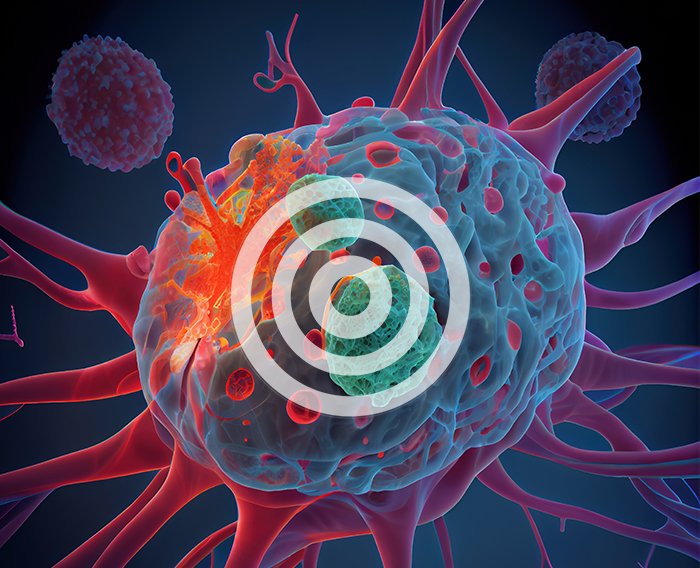
Target Therapy
One kind of cancer treatment is called targeted therapy. Targeted therapy can either target specific cells, such as blood vessel cells linked to cancer growth, or it can alter the tissue milieu in which cancer cells thrive.
Targeted therapy can be used to treat a variety of cancer types. It can also be used along with other cancer treatments, including chemotherapy. Targeted treatments are being used to treat some malignancies, but not all. Despite this, the field of research is rapidly growing, and many new targeted therapies are being explored in clinical trials.
How does targeted therapy work to treat cancer?
Many different types of cells make up other body parts. Cells include those in the blood, brain, and skin. Every kind has a certain task. Several genes typically present in healthy cells change and become aberrant, leading to cancer.
Genes give instructions to cells on how to make the proteins that keep them alive. When genes change, these proteins also change. It may cause cells to divide too frequently or too quickly. When this happens, the cells live much longer than they would otherwise. When these cells multiply unchecked, a tumor forms. Find out more about cancer’s genetics.
Researchers are working to pinpoint the precise genetic alterations that support a tumor’s growth and evolution to provide tailored therapeutics. Researchers develop a pharmacological therapy to assault a target once it has been identified. It is referred to as the drug’s “target.” A protein that is present in cancer cells but not in healthy cells would be an excellent target for this type of therapy.
The cancer cells that targeted therapies are intended to cure can experience a range of side effects:
- Disable or block signals that instruct cancer cells to proliferate and divide
- Prevent the cells from enduring longer than they should be
- Eliminate cancerous cells
When your doctor orders testing, you must select the most effective targeted therapy to determine the genes, proteins, and other elements unique to cancer. It helps in choosing the most effective course of treatment. Targeted therapies can have side effects like other treatments, so your doctor must determine the appropriate treatment and dosage for your tumor. The appropriate dose of targeted therapy is established based on several factors, including body weight and your likelihood of suffering significant adverse effects. Find out the rationale for the dosage your medical personnel has recommended.
What are the different types of targeted therapy?
Targeted therapy comes in a variety of forms. The two most broad groups are monoclonal antibodies and small-molecule drugs.
Monoclonal antibodies: Medicines called monoclonal antibodies block a specific target on the surface of cancer cells. Potentially, the area around the cancer cells will be the focal point. Additionally, cancer cells can get cytotoxic chemicals from monoclonal antibodies. For instance, chemotherapy and radiation therapy help in improving cancer cell penetration. Some monoclonal antibodies, albeit not all of them, are thought of as immunotherapies.
Small-molecule drugs: Small-molecule medications can prevent the growth and spread of cancer cells. This type of specialized therapy includes angiogenesis inhibitors. Angiogenesis inhibitors starve cancer by stopping the development of new blood vessels in the tissue surrounding the tumor. Tumors require blood vessels to carry nutrients to them. The growth of new blood vessels occurs through the angiogenesis process.
Drug-targeted therapy can have substantial side effects, like cancer treatments. However, due to the differences in how these two medications function, they are typically not the same as the side effects of chemotherapy. For instance, those who receive targeted therapy are more likely to experience skin, hair, nail, or eye issues. It is always important to discuss with your doctor any medications they have prescribed for you, including any possible side effects and how to deal with them.
Although targeted therapy is essential for treating specific cancers, scientists are always learning more about this recent cancer treatment method. Targeted therapy is frequently used with surgery, radiation therapy, and additional medications like chemotherapy, hormone therapy, or immunotherapy. With targeted therapy, specific cancer cell subtypes can be precisely identified and combated with medicines or other substances. Targeted therapy can be effective if used alone or with other therapies like conventional chemotherapy, surgery, or radiation therapy. Knowing how targeted therapy works and what to anticipate can frequently help you prepare for treatment and make wise decisions about your care if your treatment plan calls for it.
Looking for targeted therapy services in Ranchi, Jharkhand contacts Dr. Satish Sharma. Call to book an appointment.
